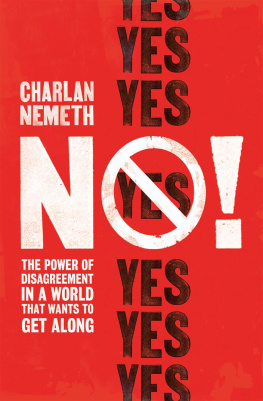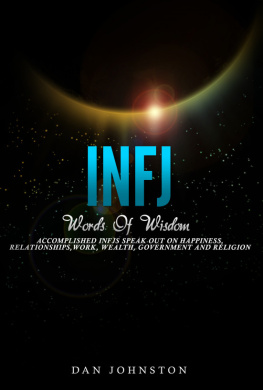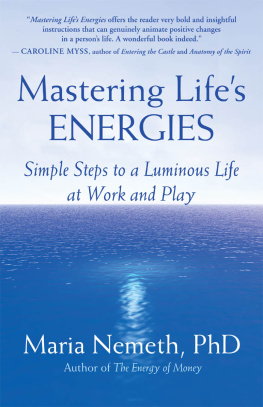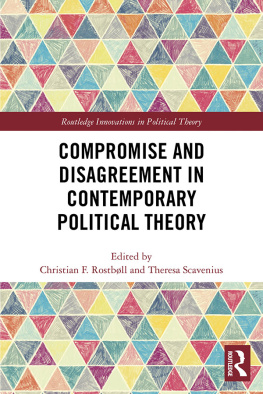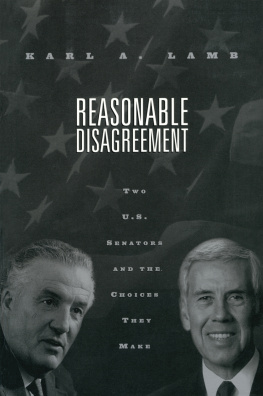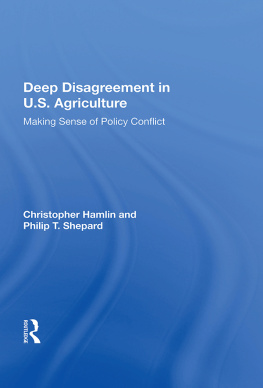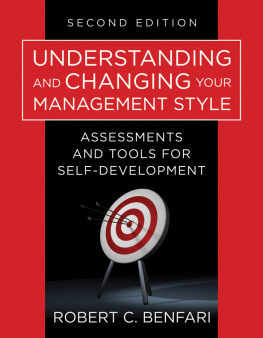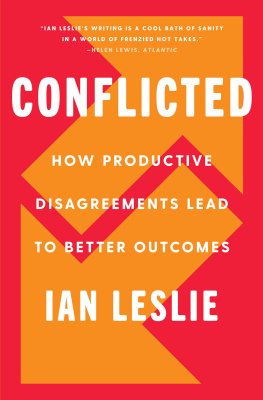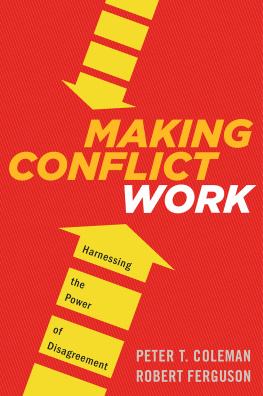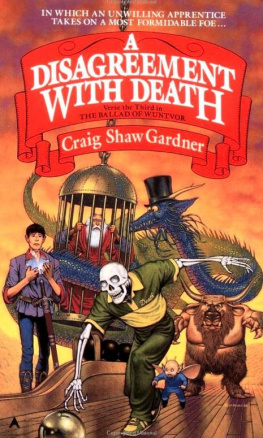Contents
Guide
Praise for
NO!
A beautifully written and important book that deserves to be read by the docile and disobedient alike. Charlan Nemeth shows why disagreement is often an engine of innovation, persuasion, and error correction.
Adam Alter bestselling author of Irresistible and Drunk Tank Pink
There is no person on the planet better scientifically qualified to write a book on the dynamics of dissent. She has repeatedly demonstrated her ability to apply the scientific literature to engaging real-world problems.
Philip Tetlock University Professor of Psychology, University of Pennsylvania, and bestselling author of Superforecasting: The Art and Science of Prediction
[A] tour-de-force of research To really understand what makes for effective dissent, you can do no better than reading what Charlan Nemeth has to say here.
Dr. Randall S. Peterson, Professor of Organisational Behaviour at London Business School
NO!
NO!
THE POWER OF DISAGREEMENT IN A
WORLD THAT WANTS TO GET ALONG
CHARLAN NEMETH

First published in the United States in 2018 by Basic Books, an imprint of Perseus Books, LLC, a subsidiary of Hachette Book Group, Inc., New York.
Published in trade paperback in Great Britain in 2018 by Atlantic Books, an imprint of Atlantic Books Ltd.
Copyright Charlan Nemeth, 2018
The moral right of Charlan Nemeth to be identified as the author of this work has been asserted by her in accordance with the Copyright, Designs and Patents Act of 1988.
All rights reserved. No part of this publication may be reproduced, stored in a retrieval system, or transmitted in any form or by any means, electronic, mechanical, photocopying, recording, or otherwise, without the prior permission of both the copyright owner and the above publisher of this book.
Every effort has been made to trace or contact all copyright holders. The publishers will be pleased to make good any omissions or rectify any mistakes brought to their attention at the earliest opportunity.
10 9 8 7 6 5 4 3 2 1
A CIP catalogue record for this book is available from the British Library.
Trade paperback ISBN: 978 1 78649 024 7
E-book ISBN: 978 1 78649 025 4
Printed in Great Britain
Atlantic Books
An imprint of Atlantic Books Ltd
Ormond House
2627 Boswell Street
London
WC1N 3JZ
www.atlantic-books.co.uk
To Serge, Henri, and Len, the priests in my life,
for teaching me to care
To Brendan and Lauren, who taught me to love
CONTENTS
ACKNOWLEDGMENTS
THIS BOOK WOULD NOT HAVE BEEN WRITTEN WITHOUT THE influence, over a lifetime, of three professors. This is a deeply personal book, and their influence has been both professional and personal. It is seen in the issues that are covered and the approach I take in thinking about them. Their influence is seen even in my choice of profession. With gratitude, they are cited in the dedication.
Len Berkowitz is responsible for keeping me in the field. I wanted to quit after one year of graduate school, and then searched for possible jobsand got thembut I still searched for something meaningful. Len found a way to keep me in social psychology. He arranged for a one-year research assistantship with Henri Tajfel in Oxford in the hopes that I would find that meaning. He was right.
I should probably credit Monsanto for keeping me in the field as well. They offered me my choice of two jobs, one as the number-two person in public relations. During the interview with the number-one person, he made it clear that he would offer me the job but advised me to turn it down. He felt that Monsanto would not be able to satisfy my intellectual interests and that I should finish my PhD. He did offer me the job, and I did take his advice.
Henri Tajfel made me care again. A vibrant, brilliant, and sometimes crazy-making Polish Jew who spent five years in a POW camp during World War II, Henri had a sense of important issues, and he set out to solve the heady issues of intergroup relations in particular. Away from my own country for the first time, and finding purpose and excitement in the studies we did, I resolved to continue in research. It was Henri who brought me and Nick Johnson to one of the very first meetings of what would be the European Association of Social Psychology. It was a small meeting consisting of the chairs of Europeand myself and Nick. We were the only studentsHenri didnt believe in rules. At that meeting, I met Serge Moscovici.
Serge was to prove to be the greatest influence on my career. Another Eastern European Jew out of the World War II era, he was a true Renaissance man, deeply educated and immersed in everything from the history of science to political science to sociology. More than anyone, Serge understood the potential power of minority voices. I was lucky enough to have a visiting professorship with him and also with Henri shortly after receiving my PhD. The time was prescient. Serge had recently completed the first experimental study of how minority views can persuade.
These three professors were also important to me personally. Len was especially important in the early days. He kept me in the field with his wise counsel every time I considered an impulsive change. He was there for me at difficult times, such as when my mother abruptly died, and at other times as well, such as when I was ready to make a stupid decision. Henri experienced and understood tragedy perhaps more than anyone I ever knew. And yet, my memories of him always include humor. He was warmly aware of how comical we all are, pumped up with our self-importance. And yet, the conversations were always serious when we discussed social identities, prejudice, and intergroup relations. Over three decades, Serge was the one whose advice I always sought, whether it was on job changes, marriage, or any of the slings and arrows that come our way throughout life. He may be one of the most brilliant and complex individuals Ive ever known. No one, in my judgment, understood influence and power better, and he never studied those issues in a vacuum. He convinced me that all research must be applicable to the world around us.
I owe these three professors a great deal. They have now all passed away, Len being the most recent. In fact, he died as this acknowledgment was en route to him. I mourn the three of them.
Among the other professors who have had a significant impact on my thinking and on my professional and personal decisions are Milt Rosenberg, Karl Weick, and Bob Zajonc. They are each special in their own way. Thanks are also due to the wonderful students I have known over the years, including Keith Brown, Cynthia Chiles, Jeff Endicott, Jack Goncalo, Julie Kwan, Ofra Mayseless, Alex OConnor, Rhonda Pajak, John Rogers, Jeff Sherman, and Joel Wachtler. I thank them from the bottom of my heart.
At a personal level, there are no people more important than my two children, Brendan and Lauren. Both exceptionally accomplished in their own right and independent (to a fault), they are the children I raised. They truly are the ones who taught me what is important and how to love. They are the first to keep me humble, though Brendans children are showing signs of taking over in that realm.

